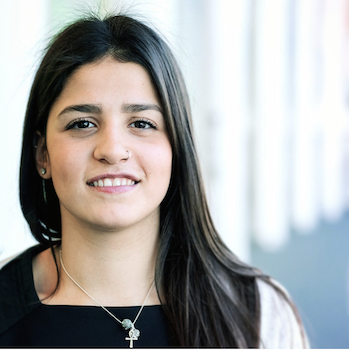
Sara Mardini was born in 1995 and grew up in Darayya, a suburb of Damascus, Syria. Her mother, Mervet, is a physiotherapist, and her father, Ezzat, is a professional swimming coach. She has two younger sisters, Yusra and Shahed. From age five, their father trained Sara and her sister Yusra to be competitive swimmers. Both sisters competed throughout Syria and the Arab world as members of top-ranked club teams and the Syrian national swimming team.
They continued training until the outbreak of the Syrian Civil War in March 2011, which made life in Syria extremely dangerous. Mardini was a law student when, in 2015, violence from the Syrian Civil War engulfed Damascus. Bombings and fighting eventually destroyed their home, and their father, Ezzat, was detained and tortured after being mistakenly identified as someone else. When an unexploded bomb landed in the pool where they trained, Sara knew it was time for them to leave. In August, Mardini's parents agreed to send her and sister Yusra to Europe. They made their way through Lebanon and into Turkey, where they arranged for smugglers to take them across the Aegean Sea. They packed into a small rubber boat meant for seven people but squeezed in 18 other refugees. Trouble soon arrived when the boat's motor failed and began sinking in water. Determined to keep everyone safe, Sara lowered herself into the water, followed by Yusra. They pushed and trod water for three and a half hours, guiding everyone safely to the shores of Lesbos, Greece. From there, they continued their journey on foot, bus, and train, reaching Berlin, Germany, after 25 days, where they settled in September 2015.
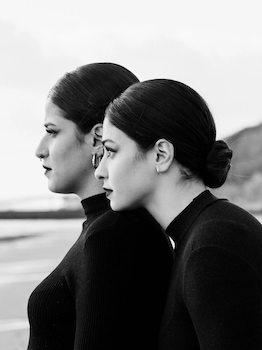
"When we got to the shore, everyone was saying thank you to us," she says. But she told them: "We are swimmers, I'm a lifeguard. This is our job. It's just natural for us to do this." She describes the night as surreal. "Even now when I say my story, I don't believe it," she says. "It doesn't feel like it happened to me. I don't feel it's real, even after one year. It feels like a movie."
Soon after, a Berlin charity connected them with the swimming club Wasserfreunde Spandau 04, marking the start of her sister Yusra's journey to the 2016 Olympic Games. Meanwhile, Sara had to stop competitive swimming due to an old shoulder injury that worsened during their sea crossing. A few months later, they brought their parents and younger sister to Berlin through family reunification. Sara had initially planned to visit Lesbos on August 18, the first anniversary of their landing there. However, she and Yusra found themselves in Rio de Janeiro, where Sara proudly cheered her sister on in the Olympic pool.
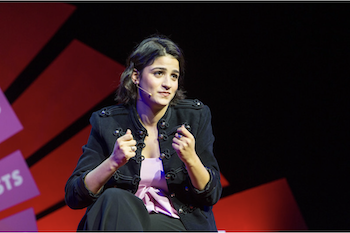
About the same time, Sara received a Facebook message from Erik Gerhardsson, a Swedish volunteer with ERCI (Emergency Rescue Centre International, a Greek nonprofit organization that provides emergency response and humanitarian aid in times of crisis.), telling her how inspirational she was to the refugees, specifically the kids who look up to her as a hero. "And right then I said, 'I'm coming,' and he said, 'What? You're just coming? Are you crazy?' and I said, 'Yes, I'm coming.'"
Mardini reported for her first ERCI shift just a few weeks later, joining a team of 20 volunteers from all over the world. Mardini found her first day of volunteering challenging. "I was thinking to myself, 'Why did we Syrians end up like this?'" she says. "We [ERCI] were standing by to help, and I was watching them. It was so painful for me to see my people like this." Mardini began volunteering at the Moria refugee camp, described by Human Rights Watch as an "open-air prison." There, she welcomed arriving migrants, distributed blankets, and served as a translator, listening and providing comfort where possible. "I'd tell them: 'I know how you feel' because I'd had the same experience, and I survived," she recalls. "I'd say that again and again. It reassured them to know that I was a refugee, just like them."
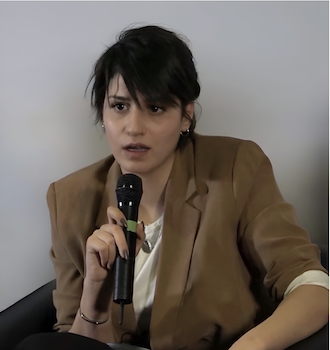
Despite it being difficult for her to be in Lesbos as it serves as a reminder of that awful night, she continues to work in hopes of helping those in need and changing how refugees are perceived. Regarding this, she has addressed the UN General Assembly in New York and audiences in Germany, France, Belgium, the Czech Republic, and Bulgaria. In 2017, Mardini began attending Bard College Berlin after being awarded a full scholarship from the College's Program for International Education and Social Change. Here, she studied economics and social sciences.
However, her commitment to refugee activism resulted in her arrest by Greek authorities in 2018. At this point, Mardini had been volunteering with ERCI for two years. While about to return to Germany for her second year at college in Berlin, she was halted by police at the Lesbos airport. Accused of aiding illegal immigration and charged with spying, smuggling, and belonging to a criminal organization, Mardini was put in jail in Athens for three months. On the same day, Seán Binder, a trained rescue diver and volunteer for the same NGO, went to the police station to meet with Mardini and was also arrested. Mardini said, "I was arrested because I was giving water and blankets to refugees," before breaking down in tears at a TED talk in London organized by the online petition platform Change.org in January 2020. On October 28, Amnesty International launched a campaign to pressure the Greek authorities to drop the case against Mardini and Sean Binder, stating that the charges are "trumped up" and "farcical." Adriana Tidona, Migration Researcher, states, "Not only are they based on an abusive interpretation of anti-smuggling legislation, but they are also not backed up by any evidence whatsoever." Mardini was released on a €5,000 bail but still faces a possible sentence of 25 years in prison. "They think if you criminalize humanitarians and make volunteers disappear, refugees will stop coming," Mardini tells TIME.
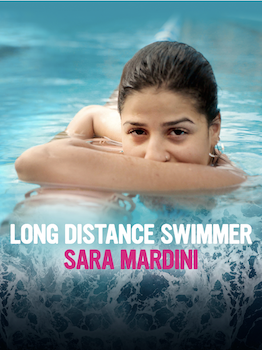
After over four years of legal delays, the trial of Mardini and others began on January 10, 2023. Three days later, the court ruled some espionage charges inadmissible. Among other procedural objections were the court's initial failure to translate documents into a language the foreign defendants could understand and faulty documentation of some of the charges. However, human trafficking charges remain, and a second trial is pending. Though not a full acquittal, the decision was seen as a partial victory and a political statement, as the European Parliament has called the case Europe's most significant instance of "criminalizing solidarity." Following the ruling, Seán Binder remarked that while there was "less injustice," true justice had not yet been achieved. Mardini has since refrained from giving interviews, feeling burdened by the lengthy legal battle.
In 2022, the Mardini sisters' powerful story was brought to screens by Sally El Hoseini in the Netflix drama The Swimmers, starring Nathalie and Manal Issa. It brought to light the harsh human reality of what it means to be displaced. A documentary on Sara, Long Distance Swimmer — Sara Mardini, from director Charly Wai Feldman, also came out in 2023, showing the sharp twist from being a celebrated humanitarian and refugee to an alleged "criminal mastermind." In it, Mardini boldly says, "Who are you to decide I can leave that person to drown?" The same year, Time magazine put Sara Mardini and her sister Yusra on their list of the 100 most influential people of 2023. "We were put in prison because we decided to save lives. But guess what? We will not stop!" says the courageous Sara Mardini.
Why Did I Choose to Research Sara Mardini?
I researched the story of Sara Mardini due to her unwavering dedication to social justice and humanitarian work. Amid the Syrian Civil War, Mardini and her sister saved fellow refugees by swimming their damaged boat to safety across the Aegean Sea—a testament to their fearlessness and resilience. Mardini continued her work by volunteering for refugees in Lesbos, offering comfort, resources, and hope to countless displaced individuals. Despite having a difficult life surrounded by war, having to escape her beloved country, only to later be wrongfully arrested while helping other refugees, followed by years of intense legal challenges, Sara's resolve remains unshaken. Her steadfast commitment to social justice, even in the face of adversity, is profoundly inspiring and motivates me to pursue meaningful change for those in need.
Works Cited
Aloian, A. (2022, November 28). Where are Yusra and Sara Mardini now? The Syrian sisters in Netflix’s “The Swimmers” and the Rio Olympics. Women’s Health. https://www.womenshealthmag.com/life/a42041920/yusra-sara-mardini-netflix-the-swimmers-now/
Amnesty International. (2023, June 7). Greece: Prosecution appeal prolongs ordeal of rescue workers Seán Binder and Sarah Mardini. https://www.amnesty.org/en/latest/news/2023/05/greece-prosecution-appeal-prolongs-ordeal-of-rescue-workers/
Brunelli, R. (2023, June 8). Syrian Refugee Sara Mardini on Her Long Swim to Freedom, Netflix’s ‘The Swimmers’ and Her Trial. The Hollywood Reporter. https://www.hollywoodreporter.com/movies/movie-news/netflix-the-swimmers-sara-mardini-interview-syrian-refugee-1235509051/
UNHCR. (2023, February 5). Syrian refugee uses swimming skills to rescue others. https://www.unhcr.org/news/stories/syrian-refugee-uses-swimming-skills-rescue-others
Sara Mardini and Yusra Mardini. (2023, April 13). Time. https://time.com/collection/100-most-influential-people-2023/6270456/sara-mardini-and-yusra-mardini/
This article was published on 7/18/25